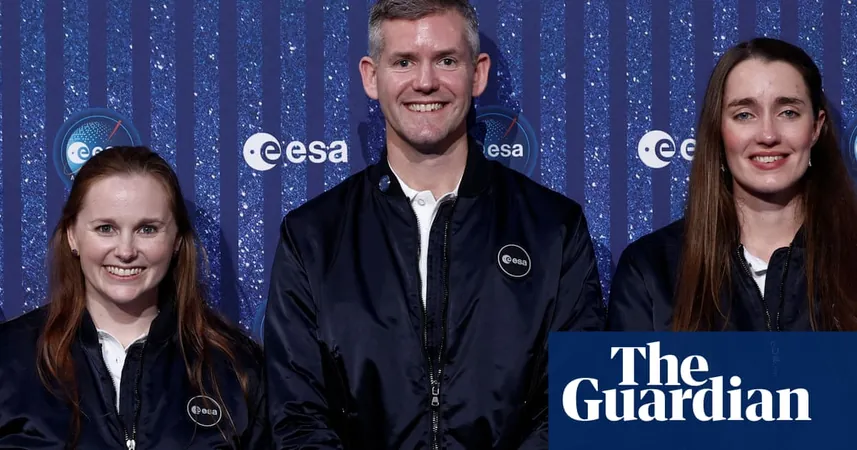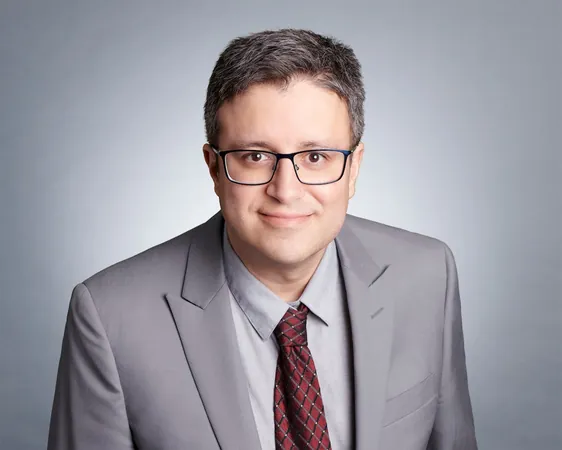
John McFall: The Trailblazing Astronaut Set to Redefine Space Exploration for People with Disabilities
2024-10-07
Author: Sophie
When John McFall, a British trauma and orthopedic surgeon, received a job posting for aspiring astronauts from a colleague, his immediate thought was, "It would be awesome to go to space." This moment sparked a journey that could break the barriers of over six decades of space exploration. McFall is now poised to become the world's first astronaut with a disability, challenging the traditional perceptions of who can venture into the cosmos.
At the age of 19, McFall lost his right leg in a motorcycle accident. Instead of being discouraged, he used this life-altering event as a springboard for success, becoming a Paralympian sprinter and winning a bronze medal at the Beijing Games. His subsequent transition into medicine highlights his resilience, showcasing that adversity can lead to remarkable achievements.
Three years after discovering that job advertisement from the European Space Agency (ESA), McFall dove headfirst into a rigorous selection process. This multifaceted assessment included psychomotor tests and rigorous panel interviews, ultimately culminating in his selection to join ESA's groundbreaking initiative focused on exploring the feasibility of astronauts with physical disabilities living and working in space.
In a recent interview, a spirited 43-year-old McFall expressed his excitement, noting a prevalent question: “Why hasn’t this been done sooner?” ESA’s methodical approach to testing McFall's capabilities in microgravity has yielded promising results, suggesting that space travel could indeed be an option for individuals with disabilities. As he trains for a potential six-month mission to the International Space Station, McFall emphasizes the importance of collecting data that demonstrates the possibilities rather than the limitations of disabled individuals in such environments.
The challenges of adapting space operations for astronauts with disabilities are significant. ESA's tests are designed to address critical issues, such as how McFall can effectively maneuver and stabilize in microgravity and assess the impact of space conditions on his prosthetic leg. So far, preliminary results are encouraging, raising hopes that McFall may pave the way for future astronauts with disabilities. "I would hope that between 2027 and the end of this decade, we’ll see a European astronaut with a physical disability as part of the International Space Station crew," he mentioned optimistically.
While McFall’s journey is currently specific to him, the larger goal is to establish a framework that opens the door for others with disabilities. “We’re challenging the narrative surrounding physical disability,” he stated, underscoring the broader implications of his work. This dialogue is crucial in breaking societal stigma and expanding the understanding of what it means to be disabled in today’s world.
An important aspect of McFall’s mission is the discourse surrounding the terminology associated with his identity. He advocates for moving away from the term "parastronaut," suggesting it may perpetuate unnecessary divides. "I’m not a para-surgeon, I’m a surgeon. I’m not a para-dad, I’m a dad," he argues, emphasizing the need for a more inclusive language that truly reflects abilities rather than disabilities.
McFall's efforts resonate beyond the realm of space exploration; they reflect the ongoing struggle faced by individuals with disabilities globally, who often confront discrimination and economic disparities. The stark reality is that, according to data from across the EU, those with disabilities frequently encounter higher unemployment rates and a greater likelihood of living below the poverty line.
In his pursuit of space, McFall aims to alter the perception of who can be an astronaut, thus creating pathways for greater opportunities across various professional spheres for individuals with disabilities. "My job is to promote a well-rounded and informed definition of disability," he stated, pushing against outdated notions and striving for a future where everyone, regardless of their physical abilities, can aspire to reach for the stars.
As McFall continues his remarkable journey, the world watches with anticipation. Will he change the course of space exploration forever? Buckle up for a new era of inclusivity in space travel!









 Brasil (PT)
Brasil (PT)
 Canada (EN)
Canada (EN)
 Chile (ES)
Chile (ES)
 España (ES)
España (ES)
 France (FR)
France (FR)
 Hong Kong (EN)
Hong Kong (EN)
 Italia (IT)
Italia (IT)
 日本 (JA)
日本 (JA)
 Magyarország (HU)
Magyarország (HU)
 Norge (NO)
Norge (NO)
 Polska (PL)
Polska (PL)
 Schweiz (DE)
Schweiz (DE)
 Singapore (EN)
Singapore (EN)
 Sverige (SV)
Sverige (SV)
 Suomi (FI)
Suomi (FI)
 Türkiye (TR)
Türkiye (TR)